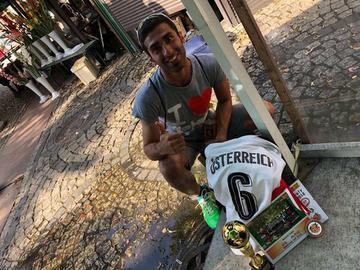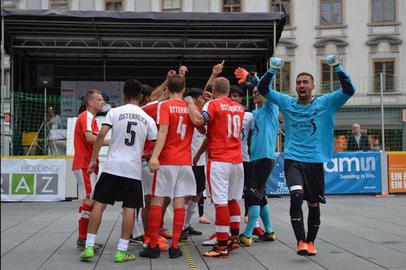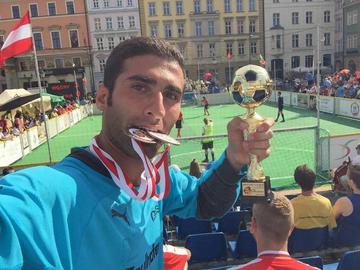When Afshar Alizadeh arrived in Austria in September 2015, he had no idea he would go on to be a national futsal star. All he wanted was a better life than the one he left behind.
Now, however, he travels regularly across the world, winning international championships for the country he has come to call his home.
It is a happy ending that he never could have imagined just a few years ago.
I first met Afshar through a colleague in Vienna. He was a sensitive young man with a broad smile. But the story of his journey from Iran was a harrowing one.
It began with his conversion to Christianity in 2014. This was a dangerous move in the Islamic Republic, where harassment of non-Shia minorities is common.
Soon after he converted, security forces launched a crackdown against Christian gatherings. When his pastor was arrested, Afshar decided the safest thing to do would be to leave Iran.
None of his family supported his decision, and he decided not to tell them he was departing the country for good.
He left with some friends and just US$1,000 in his pocket. It was a difficult choice to make, he said, but one he had “never regretted.”
A Near-Fatal Sea Journey
The group first traveled to Turkey legally with their passports. They were there when the news went viral that a two-year-old Syrian boy, Alan Kurdi, had drowned in the Mediterranean Sea.
The media storm encouraged the European Union to open its borders, and Afshar and his friends hoped to use the opportunity to make it to Switzerland.
In Turkey, they found an Iranian trafficker who agreed to help them go by boat. He told them to go to Bodrum on the south-west coast, buy a US$15,000 boat, and wait for him.
They spent all their money on the boat and left it at a local post office. However, the next day the boat was gone.
They then found a Pakistani trafficker who said he could provide an inflatable boat for US$1,500, plus US$500 expenses. “He took us on a long hike from morning to night through the mountains,” said Aylan. “We had no idea where we were going. We passed through so much barbed wire. Then finally we got to a place where around 300 people were gathered in small groups.”
The traffickers called people’s names one by one, until at last it was their turn. They were a group of seven, and they boarded a small boat with a tiny engine. The trafficker told them the engine could last 30 minutes and the trip should take no more than 20 minutes. However, after three and a half hours they were still on the water.
“The trafficker didn’t come with us. He just said: ‘Here you go, this is your boat.’ We were circling around for a while with no clear destination. He only showed us a vague sign and said that when we passed that then we would be outside Turkish territory and the responsibility of the Greek government. We didn’t even know what shore in Greece we were going to. We were all sitting on the edge of the boat and just paddling alongside the other refugees.
“Coastguard ships were also passing by, and that was the first time I experienced a close call.”

After sustaining an injury from taekwondo, Afshar started playing futsal in Austria
“We Felt Like We Beat Death”
One of the ships passed by quickly, creating huge waves that capsized some of the boats. “We all said our goodbyes,” said Afshar. “I thought I was going to die, as I couldn’t swim. But fortunately our boat remained upright. We were very lucky.”
Finally, their boat reached the shore. They removed the engine with a knife, as it would not shut down properly, then went to a shop to find out where they were. “We thought we were still in Turkey. When we heard we were in Greece, we felt invincible. That was the night 13 refugees drowned, so we felt like we beat death in those waters.”
They had reached a Greek border island. At that time, the police were helping to process refugees and facilitate their journey to the next destination. Trains, buses, cars, and boats were provided as transport.
Afshar and his friends decided to go to Athens via a cruise ship; the third story of the boat had been reserved for refugees. After three days of living on the streets, they finally boarded the ship and made it to the capital.
There, with little money and no one to guide them, they walked for four hours to reach the Macedonian border, where they encountered a sea of refugee tents. They did not stay there for long. “We got on a train at 2am and were dropped off two hours later in Serbia,” Afshar said. “That was my first time seeing the Red Cross volunteers. They gave us tea and warm milk, and provided us with a load of clothes.”
Treated Like Animals
Afshar and his friends originally planned to travel via Hungary. But they heard rumors the Hungarian police were violent with refugees, so they decided to go to Croatia instead.
“In Croatia, there were reporters and photographers everywhere, but nobody wanted to talk to them. Refugees were covering their faces. We felt like we were helping them but they weren’t helping us.”
The group were escorted by police to waiting buses. The police treated them very badly, Afshar said. “They guided us like a bunch of sheep. They were very rude and constantly insulted us. We were like war prisoners. They said we were going to a refugee camp to be fed, but it was a lie. It was an open area with barbed wire all around, where more than 1,000 people were piled on top of each other. There was no room. You felt like you were being suffocated.
“I only saw a few Iranians and the rest were Arabs. We waited in line for hours to get fingerprinted. But as soon as it was my turn, the police said we had to go to the back of the line. When I objected, they beat and kicked me.”
Afshar and friends stayed in the camp for 12 hours before deciding to escape. They took a train to a city close to the Slovenian border and paid a taxi driver €100 (US$113) to transport them the rest of the way. The driver dropped them a kilometer from the border, where building work was underway to create a new refugee camp. This was the first time Afshar called his family since leaving Iran.

Afshar with the Austrian national futsal team
“The Bullet Passed Beside My Face”
After finding a trafficker, the group entered the woods and became trapped in a swamp. It was the second close call Afshar experienced on the journey. “Everyone passed okay except me,” he said. “I got stuck and began sinking up to my chest, until my friends came to the rescue. But then we saw the police lights. We took cover and waited for a better opportunity to go, but that wait lasted from 10pm to 4am. There were helicopters above us and dogs all around us. The trafficker said to go back quickly, and we were passing through the trees and branches when they began shooting at us. I felt the heat of a bullet pass beside my face and hit the tree in front of me."
Police arrested them, but after discovering they were Iranians, they showed them the way to Austria. It was just 150 meters away, on the other side of the bridge.
“I couldn’t believe we’d reached Austria,” Afshar said. “Until then, I didn’t even know that Austria was a country. I used to think it was a city in Germany. There was no sign of police violence or insults. I decided to stay. I felt good about this country from the start.”
A Dream Come True
Soon after he arrived, Afshar was taken to a refugee camp. It was unlike the ones he had stayed in previously. “I knew that this was the place for me,” he said. “It didn’t feel like I was living in limbo, like I used to. I had an identity again.”
Five days after he arrived, he applied for asylum. In his interview, he said he was determined to stay in Austria. “I told them that even if they sent me back to Croatia, I would return again. I would never go back to my old life of danger and insecurity.”
After a week, they told him he could stay in Austria. But two of his friends were not so lucky. “It was 6 am when the police officers came,” he said. “They woke us up, took two of our friends, and sent them straight back to Croatia.
One reason Afshar decided to stay in Austria was the fact that the head of the Taekwondo Association was Iranian. Afshar had been a professional taekwondo player in Iran, but was banned due to his conversion to Christianity. When he arrived in Austria, all he had with him was a backpack with his taekwondo uniform inside. He had clung on to it tightly during the journey, as he knew he couldn’t afford to buy a new one.
Sadly, injuries prevented Afshar from pursuing his dream to practice taekwondo. But all was not lost, as he quickly realized he was a talented futsal player.
Soon he was playing for the Austrian Federation Indoor Soccer (AFIS), the oldest and largest futsal association in the world. As the national team goalkeeper, he now regularly travels overseas to play in tournaments across the globe. It is a dream come true for the persecuted young Christian from Iran. However, if asked whether he would do the journey again, he cannot say for sure.
It was the fate of a former student that made him realize the true risks of the endeavour. “It was such a dangerous journey,” he said. “I still can’t believe that we made it alive, but Mehrshah lost his life.”
Afshar is the goalkeeper for the national Austrian futsal team
“I Will Get There or Die”
In Iran, Mehrshad had been Afshar’s student. He was just 20 years old when he decided to leave for Europe, and he called Afshar many times asking for his advice about the trip.
The borders were closed by this time, and Afshar told him the journey would be impossible. But Mehrshad chose to take his chances anyway. “I told him not to come,” Afshar said. “He didn’t have any money. But suddenly he rang to tell me he was in Serbia with another friend of mine, Nariman, who was 40 years old. That was the last I heard from him.”
According to Afshar, Mehrshad and Nariman found a trafficker to help them leave Serbia by car. But the police spotted them and pursued their vehicle. The chase ended in a crash in which all occupants of the car were killed.
Afshar heard about the death from Mehrshad’s parents eight days after their phone conversation. They told him they had been asked to pay US$5,000 to retrieve his body from Serbia. “They couldn’t believe it,” said Afshar. “Even I thought it was a scam.”
“I went crazy when I heard,” Afshar told me. “I felt sick. I heard some people say that all the passengers were traffickers, but Mehrshad and Nariman just wanted freedom and a better life.”
During his last call with Afshar, Mehrshad had told him: “I either get there or die.” This was exactly the same phrase that Afshar had repeated to himself after his boat nearly capsized in the sea.
It is the same phrase that many asylum seekers tell themselves. Some of them make it, but some do not. Some lose their lives without their families being notified or their identity being discovered. Afshar knows he was lucky. But every day he remembers those who were not.
“Death took them,” he said. “But it could have been any one of us.”
Read other articles in the series:
One Man’s Story of Life and Smuggling in Baluchistan
“A Long Journey to Turkey — to Save my Mother”
"The Biggest Torture Was Losing my Identity”
visit the accountability section
In this section of Iran Wire, you can contact the officials and launch your campaign for various problems

























comments